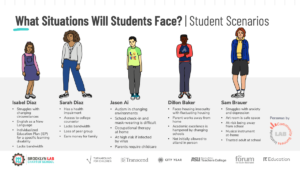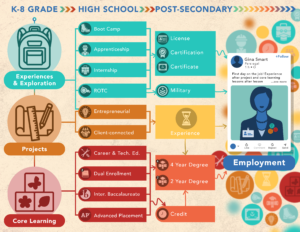Permission to Feel: The Link Between Emotional Intelligence and Academic Success

Educators are interested in student achievement. Managers are interested in maximum productivity. Parents are interested in raising kids that are successful, have opportunities and that might be happy as well. These are just a few examples of our collective interest in getting the best out of one another regardless of the environment. We know that skills and experiences are a big part of how to develop success. But one area that we may have traditionally ignored, or at least seriously underestimated or misunderstood, is that of emotional intelligence (EI).
In his new book Permission To Feel, released in September, Yale Professor Marc Brackett suggests that instead of thinking that our emotions get in the way of success, they are actually the key to it.
“We need to create a paradigm shift on how we view and value our emotions,” said Brackett. “We have emotions for a reason. They are a sophisticated and intricate system that we need to tap into.”
The book’s exploration into emotional intelligence represents decades of Brackett’s research and stems from the impact of RULER – an evidence-based approach for integrating social and emotional learning into schools, developed at the Yale Center for Emotional Intelligence. Thus far, over 2,000 schools across the country have embraced the philosophy and seen huge success.
The science behind emotional intelligence – concepts shared in RULER and now “Permission to Feel” – is really about a way of identifying, practicing and using a set of skills, according to Brackett.
“I wanted to share everything I’ve learned in 25 years of teaching and researching this around the world,” he said. “It’s about the value and importance of emotions and emotional skills. I realized that there is a deeper need in our world to give people the permission to feel all emotions.”
The permission to feel is really the beginning. Brackett suggests that we need to understand that our emotions drive our attention, memory and learning.
“How we feel – bored, curious, stressed, etc. – influences whether we are present, in ‘fight or flight’ mode, or able to process and integrate information,” he said. “And, how we feel influences all relationships – our peers, colleagues, friends, families, supervisors, leaders and more.”
In the book, Brackett introduces five key skills of emotional intelligence that he calls the RULER skills. They are:
- Recognizing emotions in self and others – face, body, voice.
- Understanding their causes and consequences – why do I feel this way?
- Labeling emotions with precise words – am I stressed or overwhelmed, content or joyful?
- Knowing how and when to express emotions across contexts.
- Having a large repertoire of strategies to regulate emotions.
The potential impact on education and work is dramatic. The schools and organizations that have adopted the RULER mindset, as well as the acknowledgment that these are emotional skills that are developmental, are seeing the global impact on success.
“If we feel psychologically safe and connected, we are better learners. If we understand emotions and how they influence brain activity, we’re better teachers,” said Brackett. “Emotionally-skilled teachers are healthier and happier. EI leaders create better workplaces. EI children have better relationships and performance.”
Brackett also points out that this book is written for a large audience – managers, CEOs, parents, educators and leaders.
“We have ignored EI for far too long. We saw emotions as weak and that work had no room for them,” he said. “But now, we can, through research, show that emotions drive performance.
There are many things being studied in terms of learning theory and how to turn them into practice. But Brackett suggests that this work is perfect for where we are now both culturally and educationally.
“It integrates well with other approaches because it’s about infusing the principles of emotion science into how school leaders lead, teachers teach, students learn and families parent,” said Brackett. “This book helps all adults learn about the value and importance of emotions and how to develop the skills to be an emotion scientist.”
It’s this idea of teaching all of us how to be emotion scientists vs. emotion judges that permeates Brackett’s work and the application to learning.
“My goal is to help all people – children and adults, teachers, leaders and parents – to be open to emotions and have a growth mindset about developing emotional skills,” he said. “Research shows that people with more developed emotional skills are healthier, happier and more effective.”
Like all skill sets, Brackett suggests that EI is not something that we are born into or will inherit automatically. Rather, he says, we need to teach them, practice them, model them and continually pursue them as lifelong learning skills.
“There is a language and art to this. There are evidence-based strategies and tested approaches that work,” said Brackett. “But it’s an intelligent system that we need to learn as early as we can and practice lifelong.”
For educators, it might be beneficial to view this as emotional literacy. “We can’t just tell someone that they have permission to feel, but rather we have to create an environment where this is fostered,” he said. “These are developmental. If teachers don’t have the skills, then we can’t give the appropriate feedback on the skills. We have to practice and model them too.”
Brackett suggests that educators who experience the RULER training and work on emotional intelligence skills end up having a transformational experience. “Most teachers have not had formal training,” said Brackett. “When they learn these skills, they end up having an aha moment. They realize what they didn’t know.”
Educators across the country have embraced the transformational approach of RULER and agree that the professional development from the Yale Center for Emotional Intelligence has changed the way they think, teach and respond to all aspects of teaching and learning.
“Since we have been using the tools and mindset associated with RULER, our classrooms are happier and more productive,” said Barbara Rose, a third grade teacher from Mercer Elementary in the Shaker Heights School District in Ohio.
She acknowledges that she and her colleagues have seen a tremendous increase in student agency, on task learning and a decrease in challenging behaviors. Rose contends that this work gives voice to students and their emotions.
“This takes the guesswork out of supporting students and how to manage their emotions to maximize their learning,” said Rose. “This is integrated into every aspect of our day.”
One of the many challenges with EI skills is that they are tougher to learn and do take more continuous effort, according to Brackett. “When we need these skills the most, they are often the hardest to access,” he said.
Brackett is excited that education, as well as the larger world, are beginning to pay attention to the power of Emotional Intelligence and the implication for greater human happiness and success.
“Emotions matter for student learning, for their decision making – for everything,” he said. “When children have the permission to feel all emotions and the skills to navigate them wisely, they are able to flourish.”
Marc Brackett can be reached at the Yale Center for Emotional Intelligence at [email protected]; more information is available on his work at marcbrackett.com. Jennifer Allen, who directs RULER training and implementation, can be reached at: [email protected].
The RULER website is: www.rulerapproach.org. Also on Facebook at The Ruler Approach and on Twitter @rulerapproach.
For more, see:
- RULER: A Comprehensive Approach to Emotional Intelligence
- Social Emotional Learning and the Future of Education
- How Schools Can Cultivate Courage in the Face of Fear
Stay in-the-know with innovations in learning by signing up for the weekly Smart Update.








0 Comments
Leave a Comment
Your email address will not be published. All fields are required.